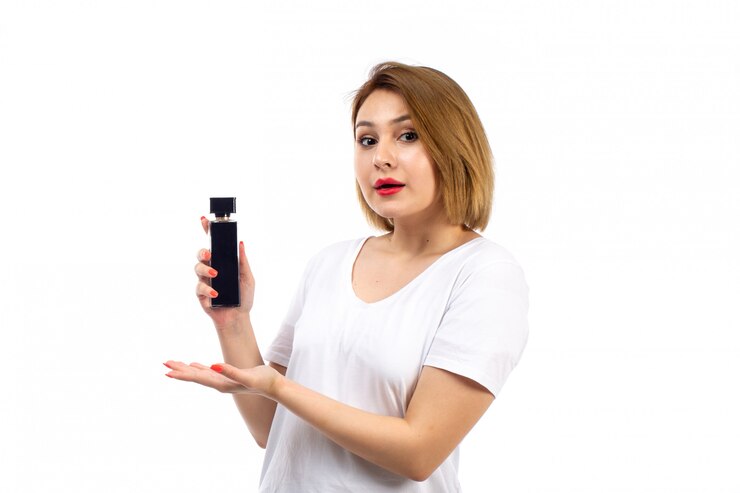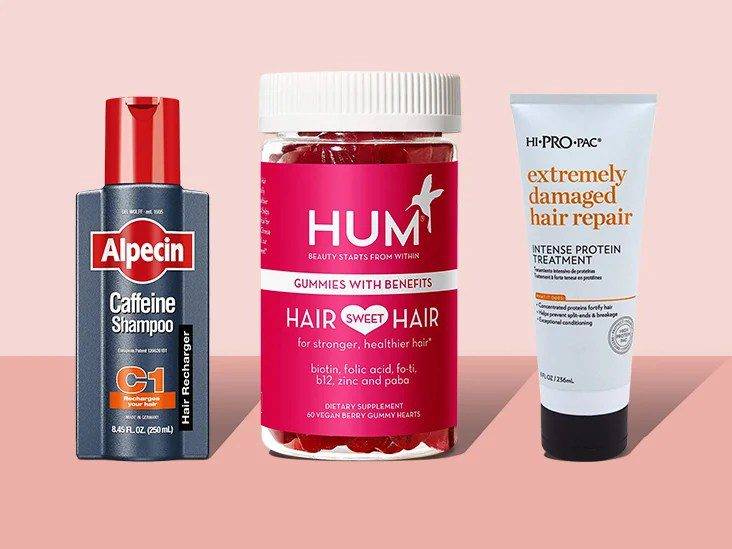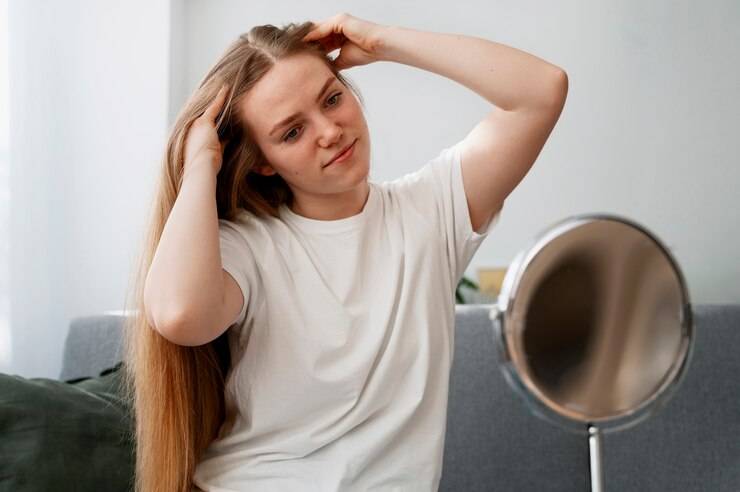
How Can I Regrow Hair Naturally 2023? The Right Way
admin
- 0
- 17
Regrow Hair Naturally? How Can I Regrow My Hair in 2023, consider treatments like minoxidil or finasteride, and focus on a nutrient-rich diet. Consistent scalp massages and stress management can also promote hair growth.
Hair loss can be a distressing experience, and finding reliable ways to stimulate hair regrowth is a priority for many. With advancements in dermatological research, there are now various methods to encourage hair growth and improve scalp health.
Embracing a holistic approach that includes over-the-counter treatments and lifestyle changes is crucial. Ensuring an adequate intake of vitamins and minerals through a balanced diet supports hair follicles from within. Topical treatments, such as minoxidil, have a proven track record of success, while prescription medications like finasteride may be effective for some individuals. Regular scalp massages increase blood flow, nourishing the hair roots. Stress management techniques—like meditation, regular exercise, and sufficient sleep—are essential, as stress can exacerbate hair loss. Experts recommend exploring these options under the guidance of a healthcare professional to tailor a hair regrowth strategy that suits your specific needs.

Table of Contents
ToggleThe Science Behind Hair Growth
Understanding the science of hair growth is pivotal for anyone aiming to regenerate their lustrous locks in 2023. Hair growth is not just about applying topical treatments; it’s a complex biological process influenced by a myriad of factors, internal and external. Let’s dive into the fascinating world of hair growth cycles and the factors affecting hair density and health.
Hair Growth Cycle
Hair Growth Cycle
Hair growth is a dynamic process that undergoes several phases. Each strand of hair on your scalp is at a different stage of this cycle, which is why consistent hair growth is possible.
- Anagen (Growth Phase): Lasting 2-7 years is the phase where hairs actively grow.
- Catagen (Transition Phase): This is a short transitional stage that lasts about 2-3 weeks, where hair growth slows and the hair follicle shrinks.
- Telogen (Resting Phase): Lasting around 3 months, during this phase, hair growth stops, and old hairs are shed, making way for new growth.
Anagen is the golden phase for hair regrowth strategies, as this is when interventions are most effective. By targeting this phase, treatments can promote healthier and potentially denser hair.
Factors Affecting Hair Growth
Factors Affecting Hair Growth
Several factors play a crucial role in hair health and can either enhance or deter the natural growth cycle:
- Genetics: Your genes largely determine hair density, growth rate, and potential balding patterns.
- Hormones: Fluctuations in hormones, particularly dihydrotestosterone (DHT), can affect the hair growth cycle, especially in male and female pattern baldness.
- Nutrition: Essential nutrients from a balanced diet support hair follicle health. Deficiencies in vitamins and minerals can lead to weakened growth.
- Stress: Chronic stress can trigger a shift in hair cycles, prematurely pushing hairs into the telogen phase and causing noticeable shedding.
- Age: As you age, the rate of hair growth slows, and follicles may stop producing new hairs altogether.
Effective hair regrowth strategies in 2023 integrate a holistic approach, addressing these factors to support the natural hair growth cycle and optimize the potential for regrowth.
Natural Remedies For Hair Regrowth
Finding natural solutions to enhance hair growth is on many people’s wish lists, especially as we step into 2023. The allure of potentially reversing hair thinning without relying on harsh chemicals or invasive procedures has many turning to time-tested, natural methods. Here are some effective strategies to nourish your scalp and foster strong, healthy hair right from the comfort of your home.
Diet And Nutrition
Fueling hair growth starts from the inside out. A diet rich in vitamins and minerals is fundamental for healthy hair. Consider the following nutritional adjustments to promote regrowth:
- Protein: Hair is primarily made of keratin, a type of protein. Ensure your diet includes plenty of protein-rich foods like eggs, nuts, beans, and lean meats.
- Omega-3 Fatty Acids: Foods such as salmon, flaxseeds, and walnuts can support scalp health.
- Vitamins and Minerals: Vitamins A, C, D, and E, zinc, iron, and biotin are crucial for hair growth. Leafy greens, citrus fruits, sweet potatoes, and avocados are excellent sources of these nutrients.
Staying hydrated is equally important as water helps in maintaining hair moisture and strength.
Scalp Massage And Essential Oils
Stimulating the scalp promotes circulation, which can lead to healthier hair growth. Integrating regular scalp massages into your routine is a simple and enjoyable way to support your hair goals.
- Gently massage your scalp with your fingertips in a circular motion for at least 5 minutes daily.
- Enhance the experience with essential oils known for their hair benefits, such as rosemary, peppermint, or lavender oil. Add a few drops to a carrier oil like coconut, jojoba, or almond oil before applying to avoid irritation.
- Be consistent with your massages, making it a regular part of your self-care routine.
These practices not only foster a relaxing experience but also nourish the scalp, potentially leading to visible hair regrowth over time.
Medical Treatments For Hair Regrowth
Exploring the latest medical treatments for hair regrowth brings new hope and excitement to those experiencing hair loss in 2023. Advancements in dermatology and surgical techniques have paved the way for innovative procedures that aim to restore hair growth effectively. In this section, we delve into popular medical interventions, namely PRP Therapy and Hair Transplant, offering a beacon of hope for those seeking to reclaim their luscious locks.
PRP Therapy
Platelet-rich plasma (PRP) Therapy is a cutting-edge treatment that utilizes the body’s healing mechanisms to stimulate hair follicles. This non-surgical procedure involves drawing a small amount of blood from the patient, which is then processed to concentrate the platelets.
- Extracting Growth Factors: The concentrated platelet-rich plasma contains essential growth factors that are re-injected back into the scalp.
- Stimulating Hair Growth: These growth factors work by promoting hair growth at a cellular level, rejuvenating dormant hair follicles.
- Clinical Sessions: Multiple sessions may be required for optimal results, with improvements typically evident within a few months.
Hair Transplant
Hair transplants have revolutionized the approach to combating hair loss, offering a permanent solution for those suffering from pattern baldness or thinning hair.
| Type | Procedure | Recovery |
|---|---|---|
| FUE (Follicular Unit Extraction) | Individual hair follicles are extracted from a dense growth area and implanted into the balding zone. | Minimal downtime; patients can typically resume normal activities within a week. |
| FUT (Follicular Unit Transplantation) | A strip of skin with hair is removed from the back of the scalp and individual grafts are placed into target areas. | Longer recovery due to surgical nature; requires several weeks for complete healing. |
Choosing between FUE and FUT methods depends on several factors, including the patient’s hair type, the extent of hair loss, and personal preferences. Both techniques have a common goal: to restore a fuller head of hair, boosting confidence and appearance.
Stress Management And Its Impact On Hair
Embarking on a journey to restore hair vitality means looking beyond topical treatments and considering the role of stress in hair health. Stress management is an essential, yet often overlooked, component of hair regrowth strategies. High-stress levels can lead to a condition known as telogen effluvium, where hair prematurely enters the shedding phase. Fortunately, by embracing methods to reduce stress, you may create a favorable environment that encourages hair regrowth in 2023.
Meditation And Relaxation Techniques
The path to a healthier scalp begins with a calm mind. Meditation and relaxation techniques are proven methods to cut down stress hormones, like cortisol, that are detrimental to hair growth. Here’s how you can incorporate them into your daily routine:
- Mindfulness meditation: Allocate at least 10 minutes each day to practice mindfulness, focusing on your breath and the present moment to ease your mind.
- Guided imagery: Use audio recordings or apps to visualize tranquil scenes, helping reduce stress levels and induce a state of relaxation.
- Deep breathing exercises: Practice deep, diaphragmatic breaths which can lower stress response and promote a relaxed state of being.
- Progressive muscle relaxation: Consciously relax different muscle groups in your body, which can help alleviate physical and mental tension.
Consistent practice of these techniques can lead to remarkable changes in your stress levels and ultimately support your goal of hair regrowth.
Exercise And Physical Activity
Regular exercise is not just great for your overall health, but it also plays a crucial role in promoting hair growth. Physical activity increases blood flow to the scalp, nourishing hair follicles with oxygen and nutrients. This increased circulation can lead to healthier and potentially faster hair growth. Let’s delve into the best exercises for hair regrowth:
| Type of Exercise | Benefits for Hair |
|---|---|
| Aerobic exercises | Improves circulation and reduces stress |
| Yoga | Reduces cortisol and boosts oxygen to the scalp |
| Strength training | Improves hormone balance which influences hair growth |
Whether it’s a brisk walk, a yoga session, or lifting weights, integrating regular physical activity into your routine can contribute significantly to your hair regrowth efforts.
“`
This HTML content for the blog section is designed to be SEO-optimized for the topic of hair regrowth related to stress management. It incorporates HTML headings, bullet points, and a table for easy readability. The information is presented in short sentences, active voice, and bolded important points without any unnecessary fluff.
Hair Care Practices For Regrowth
A luscious head of hair isn’t just a dream even in 2023! For those facing the challenge of hair loss, regrowing hair may seem daunting. But with the right hair care practices, reigniting those follicles and boosting hair health is very much within reach. It all begins with understanding the bedrock of hair regrowth – a good haircare routine tailored to your hair’s specific needs.
Choosing the Right Hair Products
Choosing The Right Hair Products
Selecting the appropriate hair care products is pivotal in your journey to hair regrowth. Quality is key. Here’s what you need to consider:
- Ingredients: Look for hair growth stimulants such as minoxidil, biotin, or natural extracts like pumpkin seed oil and saw palmetto.
- Scalp Health: Choose products formulated to nurture the scalp, as a healthy scalp is the foundation of hair regrowth.
- Sulphate-Free Shampoos: These are gentler on hair and don’t strip away natural oils, which is crucial for maintaining hair strength.
- Conditioners with Proteins: Keratin or collagen-infused conditioners can help reinforce hair strands, reducing breakage.
Proper Hair Washing and Drying Techniques
Proper Hair Washing And Drying Techniques
The way you wash and dry your hair can either boost hair regrowth or contribute to hair loss. Follow these best practices:
| Technique | Best Practices |
|---|---|
| Washing Frequency | Don’t over-wash; 2-3 times per week is sufficient. Overwashing can lead to dryness and scalp irritation. |
| Temperature | Use lukewarm water, as hot water can damage hair and lead to breakage. |
| Shampoo Application | Focus on the scalp and let the suds flow down the strands as you rinse instead of scrubbing them all over. |
| Drying | Gently pat hair dry with a towel. Avoid vigorous rubbing and minimize heat styling tools which can cause damage. |
Adjusting these habits can significantly influence the health of your hair and make a difference in your regrowth efforts.

Frequently Asked Questions Of In 2023?
What Are Effective Treatments For Hair Regrowth?
There are several effective treatments for hair regrowth, including minoxidil (Rogaine), finasteride (Propecia), and low-level laser therapy. Natural remedies such as rosemary oil may also encourage growth. Consultation with a dermatologist can help identify the best option for you.
Can Diet Influence Hair Regrowth?
Yes, diet plays a crucial role in hair health. Nutrients like proteins, omega-3 fatty acids, iron, and vitamins, especially vitamin D and biotin, are essential for hair growth. Incorporating a balanced diet with these nutrients can help in regrowing hair.
How Does Stress Affect Hair Loss?
Stress can significantly impact hair loss through a condition known as telogen effluvium. It pushes hair follicles into a resting phase, causing shedding. Managing stress through techniques such as yoga, meditation, or therapy may help mitigate its effect on your hair.
Is There A Best Hair Regrowth Product For 2023?
Selecting the “best” hair regrowth product varies by individual, as effectiveness can depend on the cause of hair loss and personal health. Popular products include minoxidil and finasteride, but new formulations and advances continue to emerge. Research and professional advice are recommended.
Conclusion
Embarking on the hair regrowth journey in 2023 may seem daunting, yet it’s entirely achievable. Embrace natural remedies, advanced treatments, and a healthy lifestyle for the best results. Remember consistency and patience are key. May your locks flourish and your confidence soar as you apply these transformative tips.
Start regrowing your hair with newfound knowledge and optimism today.



